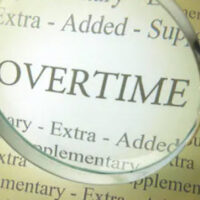Should I be paid for overtime work?

If an hourly employee works more than 40 hours per week, in most cases they are entitled to collect time-and-a-half (1.5 times their hourly wage) for working overtime. However, too often employers find reasons to decrease or avoid paying employees what they are truly worth. While it is true that some workers are ‘exempt’ from receiving overtime pay, a large portion of employees are entitled to receive it, and if you do not, you may have a claim against your employer for wage theft.
Who Is Exempt?
The federal Fair Labor Standards Act (FLSA) establishes benchmarks for the country like the minimum wage – $7.25 per hour, as of 2009 – as well as overtime pay and the correct method for keeping records. New York state law mandates a higher minimum wage of $15.00 per hour, with the same regulations requiring time-and-a-half for any hours more than their weekly average (usually 40 or 44). If you have not consistently received the appropriate amount of overtime during your work for an employer, you have 2 years under the FLSA, or 6 years under New York state law, to file a charge.
There are two types of wage and hour claims that are the most common. The first is wage theft, where you simply do not receive the overtime pay you are entitled to; the other is misclassification, where someone who is non-exempt is wrongly classified as exempt for the purpose of avoiding paying overtime. Both may entitle you to back pay and other damages, if you can establish that you have missed out on income or benefits you would otherwise be entitled to receive.
Different Types of Claims
If you think you may have a claim for wage theft, be aware that overtime requirements do not apply to so-called “exempt” employees. Exempt employees are generally those working in management, business administration, or have other specialized jobs like working in computer science, sales, or in a “recognized creative or artistic field.” The nature of the work one does is what determines exempt status, rather than one’s job title, but each case is different and will generally be decided on a case-by-case basis.
Misclassification claims are also decided largely on a case-by-case basis simply because the line between non-exempt employees, exempt employees, and independent contractors can be difficult to define. Some employers may make honest mistakes, but given the costs associated with properly paying one’s employees (providing not only appropriate wages, health benefits, and overtime pay, but also workers’ compensation insurance and disability accommodations), too many employees will deliberately misclassify employees to try and save money. If this has happened to you, make no mistake: deliberate misclassification is fraud, and you likely have a case against your employer.
Call A New York City Employment Attorney
Employees give their effort to their employer, expecting to be appropriately rewarded. If you do not receive what you deserve, you have the right to seek it out. The New York City unpaid overtime attorneys at Mansell Law, LLC can try to answer any questions you have about wage and hour claims, and put you on the right track toward seeking compensation. Call our offices today at 646-921-8900 for a free consultation.
Resource:
labor.ny.gov/ui/employerinfo/employer-misclassification-of-workers.shtm
